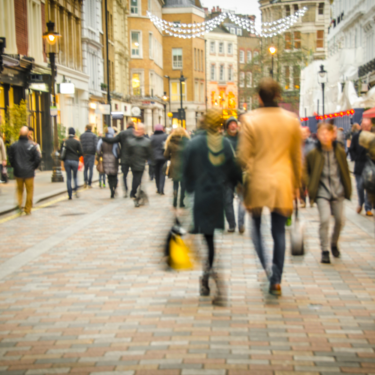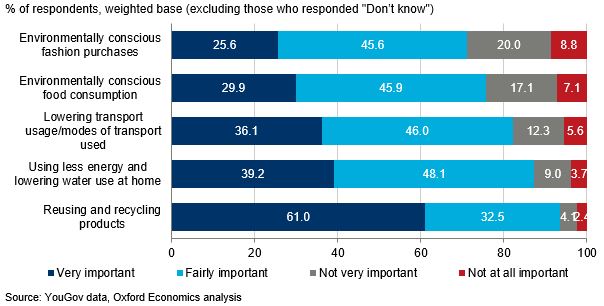Blog | 04 Nov 2021
UK companies must adapt to changing consumers’ behaviour

Phil Thornton
Economics Editor

In the run up to Cop-26 much discussion has centred on the central role of UK businesses and government directives in addressing challenges associated with climate change and environmental sustainability more broadly.
But what about another key stakeholder group—consumers—whose preferences and habits will both directly and indirectly (through their influence on businesses and government) shape our environmental future? Drawing on recent research, we look the role of UK consumers through the lens of three key lifestyle domains—shopping, travelling and eating.
UK consumers are pivoting away from fast fashion
Few behavioural shifts have been as stark during the pandemic as the switch to online shopping. But within that, there have been more subtle shifts. Our research, on behalf of Clearpay and the British Fashion Council, suggests that a majority of UK consumers regard “environmentally conscious fashion purchases” as an important part of the shift towards a lower-carbon economy (Fig. 1). Indeed, we found evidence that this has had a discernible effect on consumers’ shopping habits, with a majority (62%) of UK adults citing “long-term wearability” as an important guiding force when purchasing clothes.
Fig 1. Perceived importance of lifestyle choices for shifting towards a lower-carbon economy
However, a transition towards more durable, locally sourced items will inevitably entail higher prices. Here, our survey analysis highlights that the pandemic has exacerbated the challenge as price-conscious consumers are much more likely to indicate that their financial situation had worsened during the previous 12 months. Moreover, there is reason to fear that this trend will worsen this year given inflationary headwinds and an impending tightening of fiscal policy.
Holidaymakers have embraced the lure of home
The pandemic restrictions, particularly for air travel, led to a sharp rise in the number of “staycations” in advanced economies as families holidayed at home rather than abroad. For example, research by Oxford Economics’ Tourism Economics shows that prohibitive travel guidelines by European countries in the summer of 2020 led the domestic share of travel journeys to rise from 55% in 2019 to 69% in 2020. As restrictions are lifted there will undoubtedly be a resurgence in foreign travel as people take holidays they missed out on. However, many families who have taken a staycation for some—or perhaps the first—time, may wish to continue to holiday at home rather than create more greenhouse gas emissions by flying abroad.
Meat alternatives to benefit from dietary and climate change concerns
The disruption to fresh meat supplies in the UK in the midst of the Covid-related supply chain crisis had added to consumers’ concerns about the dietary and climate-change impacts of our reliance on a meat-based diet. The latter point is certainly backed by scientific evidence—the statutory Climate Change Committee has said the amount of meat people eat in the UK needs to be brought down by more than a third by 2050 as part of the country’s drive to net zero.
One way to mitigate the impact of meat consumption on the environment, without a significant shift in our dietary habits, is through a switch to cultivated (lab-grown) products. Life-cycle analysis has demonstrated that this would significantly reduce the carbon footprint of production compared with conventional farming methods.
In a study we did for Ivy Farm Technologies, which is developing cultivated meat, we found the market could be worth £1.7 billion a year in the UK and support as many as 16,500 jobs by 2030, many of them highly skilled. It would also have the benefits of reducing the UK’s dependence on meat imports and lead to improvements in levels of human health, animal welfare, and sustainable farming. Although the industry is awaiting regulatory approval in the UK, companies are seeking to get ahead of an emerging consumer trend by developing meat substitutes to meet expected future demand.
Companies must explore ways to rebuild trust with customers and clients as their behaviours and preferences change in the wake of Covid-19 and amid a growing desire for sustainability. Firms that can double down on reducing their carbon impact as they emerge from the crisis by adjusting their operations, while adapting to these fast-moving customer demands, will be rewarded with greater brand loyalty and long-term competitiveness.
Tags:
You may be interested in

Post
Mapping the Plastics Value Chain: A framework to understand the socio-economic impacts of a production cap on virgin plastics
The International Council of Chemical Associations (ICCA) commissioned Oxford Economics to undertake a research program to explore the socio-economic and environmental implications of policy interventions that could be used to reduce plastic pollution, with a focus on a global production cap on primary plastic polymers.
Find Out More
Post
How Canada’s wildfires could affect American house prices
The Northern Hemisphere is now heading into the 2024 fire season, having just had its hottest winter on record. If it is anything like last year, we can expect to see further impacts on people, nature, and global markets.
Find Out More
Post
Beyond assumptions – the dynamics of climate migration
Millions of people have already been displaced because of environmental shocks, but many aspects of climate migration remain poorly understood. This confusion has led to oversimplified assumptions about its causes and effects – in reality, it’s more complicated and has many nuances.
Find Out More